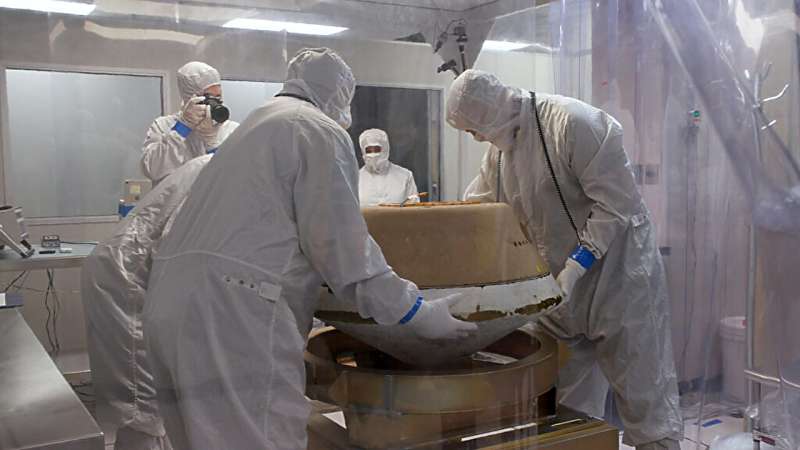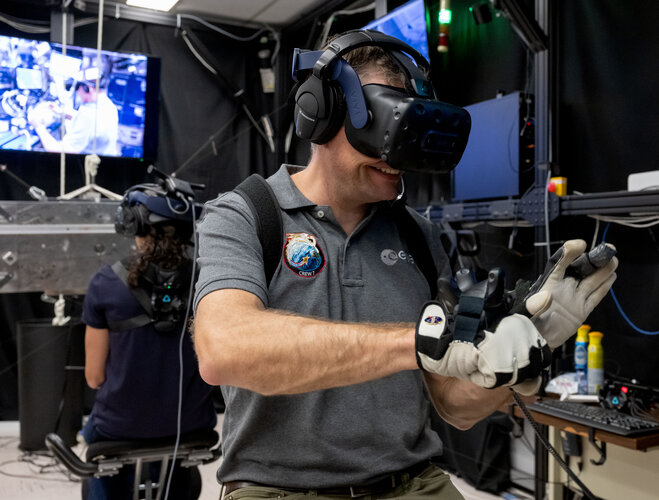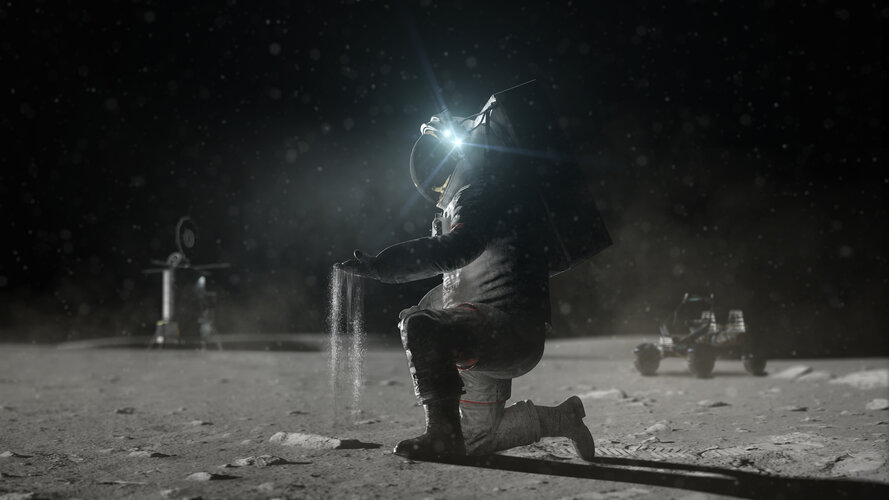Northrop Grumman takes $36 million charge on NASA Gateway module
Thursday, 27 July 2023 15:39
Northrop Grumman said it took a $36 million charge on its contract to build a module for NASA’s lunar Gateway, citing changing mission requirements and broader economic issues.
Meteor showers—it's worth looking out for 'shooting stars' all year round
Thursday, 27 July 2023 15:20
If you have ever seen a shooting star on a clear night, surely someone has invited you to make a wish. Nevertheless, this is a natural phenomenon without any magical connotation—beyond its great beauty, of course.
What is a shooting star, really? Where do these glowing, moving bodies come from? How and when can we observe this astronomical phenomenon?
Meteor shower or shooting stars?
Although we popularly call them shooting stars, they are not really stars but glowing dust particles. To understand why, it is a good idea to first distinguish between a meteoroid, meteor, and meteorite.
The word "meteor" refers to the astronomical phenomenon that occurs when one or more particles of matter (meteoroids) enter the atmosphere at high speed. These meteoroids, which are usually very small (between a tenth of a millimeter and a few centimeters in size), are fragments of dust, ice, or rock that wander through space.
NASA's OSIRIS-REx spacecraft adjusts course to get closer to Earth
Thursday, 27 July 2023 14:16
On July 26, NASA's OSIRIS-REx spacecraft fired its engines for about 63 seconds to slightly thrust itself onto a course closer to Earth.
Preliminary tracking data indicates OSIRIS-REx changed its velocity, which includes speed and direction, by 1.3 miles, or 2 kilometers, per hour.
Pair of Chinese launches put flat-panel satellite, new spy sats in orbit
Thursday, 27 July 2023 13:22
China has conducted a pair of orbital missions to launch a commercially developed flat-panel communications satellite and a new batch of spy satellites.
Better SAFER than sorry
Thursday, 27 July 2023 12:00 Image:
Astronaut Andreas Mogensen undergoing VR training for EVA emergencies
Image:
Astronaut Andreas Mogensen undergoing VR training for EVA emergencies Keeping your underwear clean on the Moon
Thursday, 27 July 2023 11:30
When astronauts return to the Moon they will be bringing along a new generation of spacesuits, designed to withstand the harsh conditions of the lunar surface. But in keeping their human occupants safe and comfortable, these suits might also become a fertile environment for harmful microbial life – especially as astronauts will potentially be sharing suits with one another.
Surface Avatar - an astronaut on board the ISS controls a robot team on Earth
Thursday, 27 July 2023 08:39Webb Snaps Highly Detailed Infrared Image of Actively Forming Stars
Thursday, 27 July 2023 08:39 Young stars are rambunctious! NASA's James Webb Space Telescope has captured the "antics" of a pair of actively forming young stars, known as Herbig-Haro 46/47, in high-resolution near-infrared light. To find them, trace the bright pink and red diffraction spikes until you hit the center: The stars are within the orange-white splotch. They are buried deeply in a disk of gas and dust that feeds t
Young stars are rambunctious! NASA's James Webb Space Telescope has captured the "antics" of a pair of actively forming young stars, known as Herbig-Haro 46/47, in high-resolution near-infrared light. To find them, trace the bright pink and red diffraction spikes until you hit the center: The stars are within the orange-white splotch. They are buried deeply in a disk of gas and dust that feeds t Water discovered in rocky planet-forming zone offers clues on habitability
Thursday, 27 July 2023 08:39 Using the James Webb Space Telescope, the MPIA-led MINDS research collaboration discovered water in the inner region of a disk of gas and dust around the young star PDS 70. Astronomers expect terrestrial planets to be forming in that zone. This is the first detection of that kind in a disk that hosts at least two planets.
Any rocky planets produced in the inner disk would benefit from a su
Using the James Webb Space Telescope, the MPIA-led MINDS research collaboration discovered water in the inner region of a disk of gas and dust around the young star PDS 70. Astronomers expect terrestrial planets to be forming in that zone. This is the first detection of that kind in a disk that hosts at least two planets.
Any rocky planets produced in the inner disk would benefit from a su Sols 3895-3897: Navigating Through the Crater Cluster
Thursday, 27 July 2023 08:39 Earth planning date: Friday, July 21, 2023: Curiosity is working her way through the "Jau" crater cluster, with the goal of trying to understand how all of these small craters formed and have since been eroded.
To do that, the team is hoping to assess the target rocks, any evidence for the impactor, and the morphology of the craters. While the craters are very easy to see in orbital images
Earth planning date: Friday, July 21, 2023: Curiosity is working her way through the "Jau" crater cluster, with the goal of trying to understand how all of these small craters formed and have since been eroded.
To do that, the team is hoping to assess the target rocks, any evidence for the impactor, and the morphology of the craters. While the craters are very easy to see in orbital images Ex-intel officer says US hiding info on alien craft
Thursday, 27 July 2023 08:39 We are not alone - and American authorities are covering up the evidence, a former US intelligence officer told a congressional committee on Wednesday.
David Grusch testified that he "absolutely" believes the government is in possession of unidentified anomalous phenomena, or UAPs - which has replaced the term UFO in official parlance - as well as remains of their non-human operators.
We are not alone - and American authorities are covering up the evidence, a former US intelligence officer told a congressional committee on Wednesday.
David Grusch testified that he "absolutely" believes the government is in possession of unidentified anomalous phenomena, or UAPs - which has replaced the term UFO in official parlance - as well as remains of their non-human operators. Goddard, Wallops Engineers Test Printed Electronics in Space
Thursday, 27 July 2023 08:39 Today's small spacecraft pack sensors, guidance and control, and operating electronics into every available space. Printing electronic circuits on the walls and structures of spacecraft could help future missions do more in smaller packages.
Engineers successfully tested hybrid printed circuits at the edge of space in an April 25 sounding rocket flight from NASA's Wallops Flight Facility n
Today's small spacecraft pack sensors, guidance and control, and operating electronics into every available space. Printing electronic circuits on the walls and structures of spacecraft could help future missions do more in smaller packages.
Engineers successfully tested hybrid printed circuits at the edge of space in an April 25 sounding rocket flight from NASA's Wallops Flight Facility n Retired stars join the young stars' party in the sky: how evolved stars contribute to the early heating of Earth
Thursday, 27 July 2023 08:39 Researchers from the University of Sheffield and Imperial College London have spotted a 'retired' Asymptotic Giant Branch (AGB) star passing through a young star-forming region, something which was previously thought not to happen.
The researchers identified this interaction occurred in one of the places where they think stars like our Sun must form, using the Gaia satellite, a 740m euro
Researchers from the University of Sheffield and Imperial College London have spotted a 'retired' Asymptotic Giant Branch (AGB) star passing through a young star-forming region, something which was previously thought not to happen.
The researchers identified this interaction occurred in one of the places where they think stars like our Sun must form, using the Gaia satellite, a 740m euro In search of electromagnetic counterparts of gravitational waves
Thursday, 27 July 2023 08:39 Alessandra Corsi knows that when you shoot for the stars, anything can happen. It's in that spirit of intellectual curiosity that Corsi, an associate professor in Texas Tech University's Department of Physics and Astronomy, will peer into some of the farthest recesses of space in search of gravitational waves.
"We are at a critical moment in this field," she said. "We had one event in 2017
Alessandra Corsi knows that when you shoot for the stars, anything can happen. It's in that spirit of intellectual curiosity that Corsi, an associate professor in Texas Tech University's Department of Physics and Astronomy, will peer into some of the farthest recesses of space in search of gravitational waves.
"We are at a critical moment in this field," she said. "We had one event in 2017 Multi-levitation bioprinting of heart models for space exploration and medicine
Thursday, 27 July 2023 08:39 As a bold venture at the forefront of biomedical research, the PULSE project is poised to develop paradigm-changing bioprinting technology for applications in space and on Earth. Awarded nearly 4 million euros by the European Innovation Council's Pathfinder Open, PULSE emerges from interdisciplinary scientific collaborations and, over five years, will foster technological innovations to improve
As a bold venture at the forefront of biomedical research, the PULSE project is poised to develop paradigm-changing bioprinting technology for applications in space and on Earth. Awarded nearly 4 million euros by the European Innovation Council's Pathfinder Open, PULSE emerges from interdisciplinary scientific collaborations and, over five years, will foster technological innovations to improve 
